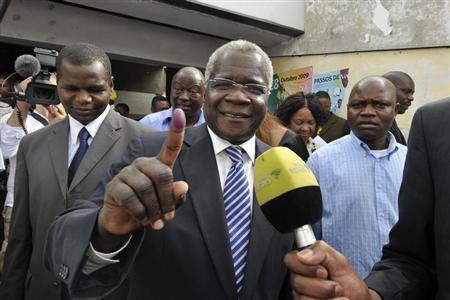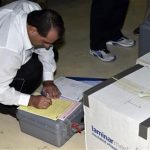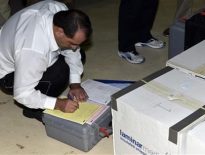(Reuters) – Mozambique’s Renamo opposition party said on Wednesday the army was trying to hunt down and kill its leader after President Armando Guebuza said the former rebel group was threatening national sovereignty with renewed attacks.

Renamo chief and ex-rebel commander Afonso Dhlakama is in hiding in the mountains of central Mozambique after government troops on October 21 overran his jungle base camp, where he had been living for a year after withdrawing from city life.
This week the army captured another Renamo jungle camp in central Sofala province, tightening a military noose around Dhlakama and his followers who are holed up in the nearby Gorongosa mountains, military officials say.
“(Renamo) President Dhlakama is being hunted down with weapons. The intention is to kill him,” Renamo spokesman Fernando Mazanga told Reuters.
Dhlakama was nevertheless alive and well in a secret location, he said.
Citing attacks by Renamo partisans since April against civilians, police and army posts, and road and rail traffic, Guebuza’s spokesman said these constituted “armed aggression that threatens national sovereignty”.
The fighting has raised fears of wider conflict in the southern African nation which suffered civil war from 1975-1992 between Renamo and the ruling Frelimo party.
Renamo, which has lost every election since 1992 to Frelimo but holds 51 seats in the 250-member parliament, demands the government reform the electoral system and halt what it says is Frelimo’s misuse of the police and army for political ends.
There are also concerns that the violence – although mostly focused several hundred kilometers (miles) north of the capital Maputo – may worry international investors who are developing big coal and gas deposits in the former Portuguese colony.
Mazanga said Dhlakama, who has not been seen in public since the army’s capture of his Sathunjira base last week, was still willing to hold talks with Guebuza, but only if the president called off the military offensive.
The presidency said Guebuza was also willing to meet the Renamo leader but the army would continue to defend the nation’s “independence, sovereignty and integrity”.
Government troops have also been moving against Renamo partisans in northern Nampula province.
Suspected Renamo guerrillas ambushed a truck carrying goods and passengers on Wednesday at Caramaja in Nampula province, killing two people, a provincial police spokesman said.
In central Sofala province, armed men also suspected to be from Renamo attacked military escort vehicles, wounding five people, local media reported. This followed the ambush of a civilian passenger minibus in Sofala at the weekend, which killed one person and wounded 10 more.
APPEALS FOR DIALOGUE
Renamo and government spokesmen have been cautious about giving precise casualty figures, but some Mozambican press reports have spoken of nearly 60 killed in the recent fighting.
The United Nations, former colonial ruler Portugal, the Catholic Church and foreign donor governments including the United States have all called on Frelimo and Renamo to negotiate their differences and avoid a return to war.
Describing the recent attacks as acts of terrorism, the Mozambican presidency said Renamo had entered “a situation of unconstitutionality”.
In response, Renamo’s Mazanga said the movement was a legally registered party and an active participant in the multi-party democratic political system installed by the 1992 peace pact that ended the war.
“Our presence in the national assembly is a mandate that we were given by the people,” he said.
Renamo was however planning to boycott November 20 municipal elections because it considered the voting system biased.
Joseph Hanlon, a senior lecturer at Britain’s Open University and an expert on Mozambique, said the military crackdown against Renamo’s armed wing looked like a further erosion of Dhlakama’s position.
“Dhlakama ends up with less power and ability to negotiate,” he said. “It won’t help his electoral potential.”
(Additional reporting and writing by Pascal Fletcher in Johannesburg; Editing by Angus MacSwan)





